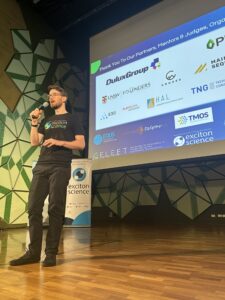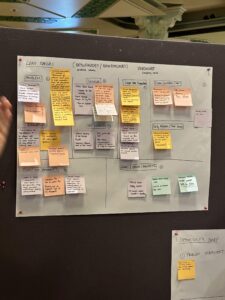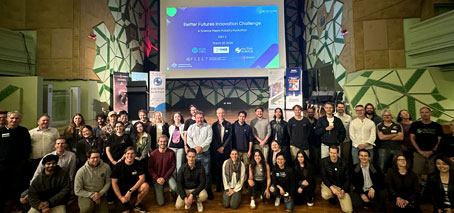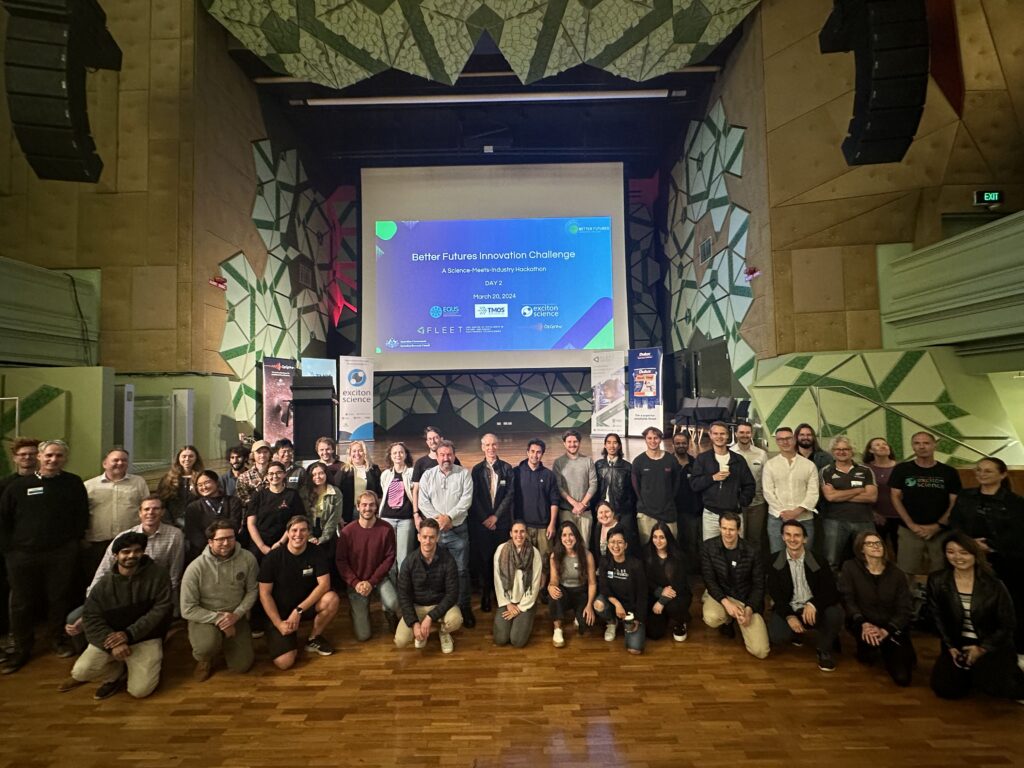
Event coordinator Nicholas Kirkwood, Chief Operating Officer, ARC Centre of Excellence in Exciton Science
Faster ways to respond to emergencies and ultra-sensitive quantum seismometers for earlier detection of earthquakes, were two ideas that emerged from teams of intrepid researchers from five Centres of Excellence who competed in the inaugural Better Futures Innovation Challenge to solve critical industry problems.
Industry partners for the deep-tech hackathon had access to researcher skills spanning the fields of physics, chemistry, data science, optics, complex systems modelling, and quantum technologies.
“A further aim of the event was to break down the silos between academia and industry, build a pipeline of commercially valuable research, and train the next generation of Australian innovators,” says Nick Kirkwood, Chief Operating Officer at Exciton.
Seven teams competed to deliver the most cutting-edge solutions to very real industry challenges. Industry and academic mentors were on hand to guide and advise.
Three teams’ ideas saw them short-listed. They will receive up to $5,000 per team to develop their ideas into a workable solution. Industry mentors, eminent scientific advisors and commercialisation experts from each of our universities will be available to help each team develop their ideas.
Shortlisted winners
- ‘AntE-hot’ Passive, radiative-cooling coatings for shipping containers to reduce refrigeration costs (Team: Sam Brooke, Kyla Rutherford, Amit Kessel and Eliza Rokhsat).
- ‘AidMate’ Accelerating logistics in disaster situations (Team: Lukas Wesemann, Sam Vaughan and Tania Barone).
- Quantum Earthquake Detector (QED!) An inexpensive, robust, sensitive seismometer utilising quantum tunnelling (Team: Julian Ceddia, Kyle Portwin, Nicholas Godfrey and Errol Hunt).
 “This was a ground-breaking example of what can happen when we bring science and Industry together in Australia,” says Myles Tehan, Managing Director of Hack Days Australia, and facilitator of the Better Futures Innovation Challenge (BFIC).
“This was a ground-breaking example of what can happen when we bring science and Industry together in Australia,” says Myles Tehan, Managing Director of Hack Days Australia, and facilitator of the Better Futures Innovation Challenge (BFIC).
The winning team will be decided following a final presentation in May. Members of the winning team each receive up to $500.
“The ambitious goal of this event is a spin-out or industry commercialisation of a BFIC idea. But we’d also love to see ongoing R&D collaborations grounded in practical use cases, researchers empowered to identify and validate societally or commercially useful problems, and easier transition into industry jobs,” says Nick Kirkwood.
“As a research scientist I have scattered pieces of knowledge and the Hackathon brought all of that together, taught me new valuable things, and put me in an environment to actually use this information for a specific goal: matching a scientific idea and technology to a market need and application, then pitching it to an audience.
Having the industry/commercial mentors was fantastic. I was able to challenge some of my assumptions by discussing our ideas and thoughts about translating scientific research with the mentors,” say Sam Brooke (Exciton Science), a member of the short-listed AntE-hot team.
The long-listed ideas
- ‘Thermal transformers’ Two-layer thermoelectric, thermally active building materials that can heat or cool buildings (Kyle Boschen, Thomas Cheevers and Kalim Kashif),
- ‘VerdiCoat Solutions’ Improving urban spaces and health with moss-coated buildings (Jefferson Lam, Alicia Schuitemaker, Gokalp Akinoglu, Alice Chen and Joshua Rand).
- ‘LabSafe’ Smarter inventory-tracking and risk-management systems for labs (Shi Tang, Michael Harvey, Andrew Groszek and Yudian Li).
- ‘Quantum Tech Educational Unit’ Quantum education kits for the masses (Jonathan Tollerud, Daniel McEwen, Fatemeh Mohit, Sangeet Santhosh Kumar, Mitch Conway, PhD and Subhajit Chakraborty).
And some of the intriguing ideas that ended up on the cutting room floor
Thank you to all our mentors, judges and industry partners who provided us with access to some wonderful expert minds to assist our teams throughout the event.
Industry partners: Dulux, Pentalym
Centre of Excellence Partners: ARC Centres of Excellence: Exciton Science, Engineered Quantum Systems (EQUS), Gravitational Wave Discovery (OzGrav), Transformative Meta-Optical Systems (TMOS) and FLEET.


